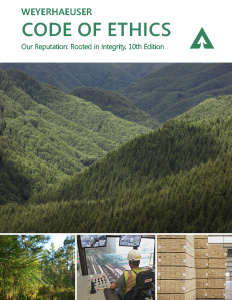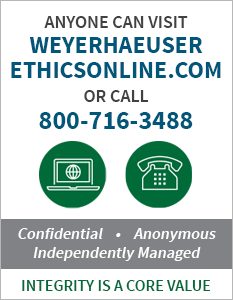 Integrity
Integrity
We do the right thing the right way
Integrity is our longest-held core value at Weyerhaeuser and a critical part of our company vision. We have a strong, long-standing culture of ethics, and over our more than 125-year history we have earned a reputation for conducting business honestly, fairly and with integrity. In 2025, we celebrated our 16th year of being recognized as one of the World’s Most Ethical Companies® by the Ethisphere Institute, a global leader in defining and advancing the standards of ethical business practices. This honor acknowledges our deeply rooted culture of integrity and compliance at every level of the company.
Our Ethics and Compliance program drives our integrity practices and includes our long-established Code of Ethics, consistent ethics training for employees, confidential resources to report ethics concerns or questions and clear expectations for suppliers.
WE REGULARLY REVIEW AND REVISE OUR CODE OF ETHICS
Established in 1976, our Code of Ethics clearly outlines our expectations for ethical business conduct at Weyerhaeuser. Our Code of Ethics is a resource for all employees and board members on ethical decision-making and provides guidance on topics such as conflicts of interest, antitrust and competition laws, international business conduct, preventing harassment and discrimination, human rights, health and safety and more. We periodically update our Code of Ethics to reflect changes in laws, company policies or best practices.
On March 23, 2023, Weyerhaeuser adopted the 10th edition of its Code of Ethics (the code is also available in Spanish and Japanese translations). This edition amends some definitions in accordance with relevant laws, aligns with new regulations and best practices as well as updated internal policies, improves the organizational structure and accessibility, and reflects an overall update to various code provisions.
As also stated in our most recent Annual Report and Form 10-K, we will disclose here, in lieu of filing a Current Report on Form 8-K with the SEC, amendments to any provision of the Code of Ethics that apply to our chief executive officer, chief financial officer and principal accounting officer, as well as any waivers from any provision of the Code of Ethics granted to our chief executive officer, our chief financial officer or principal accounting officer.
WE CONDUCT RECURRING ETHICS TRAINING
We regularly provide comprehensive ethics training to all employees and ensure employees in key roles complete a certificate of compliance. We periodically update our ethics and compliance training modules and refresh our enterprise risk assessment annually. We always encourage our employees to ask before they act if the path forward is not clear.
WE ENCOURAGE PEOPLE TO REPORT ETHICAL CONCERNS
Employees, senior management, officers and directors share responsibility to ensure Weyerhaeuser acts ethically in everything we do. We maintain a speak-up culture, and employees are expected to promptly report any conduct inconsistent with our Code of Ethics, company policies or the law.
We encourage everyone, whether internal or external, to report concerns or ask questions about potential violations of our Code of Ethics, company policies or the law. Anonymous questions or concerns can be submitted to our EthicsLine at 800-716-3488 or by visiting Weyerhaeuser EthicsOnline. These resources are managed by an independent company and are available in multiple languages 24 hours a day, seven days a week. The resulting confidential case reports are quickly referred to our Ethics and Compliance team. Concerns about accounting, audit matters or internal controls can also be submitted to the chair of our board of directors' Audit Committee by contacting our corporate secretary. Employees are empowered to report concerns to managers, supervisors, our human resources team and directly to the Ethics and Compliance team. In 2024, the Ethics and Compliance team and legal investigation program received 197 submissions. Of these, 33 percent were found substantiated or partially substantiated, and 9 percent were questions that did not require investigation. Most of the submissions (82 percent) were related to employment, with the remainder related to business integrity, health and safety, and other general questions or concerns.
WE EXPECT OUR SUPPLIERS TO BE ETHICAL
We use a variety of processes to ensure both our company and our supply chain are managed ethically.
Safety comes first
We expect our suppliers to provide a safe work environment; comply with and maintain policies consistent with our applicable environmental, health and safety laws; and act in accordance with our Supplier Code of Ethics when working for us. (The code is also available in Spanish, Japanese, French, German, Italian and Chinese translations.)
Weyerhaeuser’s standard terms of purchase require suppliers comply with all applicable laws, including safety, labor and employment laws, and adhere to the Weyerhaeuser Supplier Code of Ethics in their own operations and supply chain to ensure our expectations and standards are met.
Performance and diversity
We establish robust supply chains for our products and work to enhance their performance through proactive support of our contractors and suppliers. And, because talent and innovation are found everywhere in our communities and inclusion is one of our core values, we work with a diverse array of suppliers.
Risk and value
To mitigate risk and create the best possible value, our procurement programs are committed to reducing cost, enhancing supply chain resilience and selecting suppliers who are aligned with our needs and values. We also consider other factors when selecting suppliers, such as administrative costs, ongoing technical support and maintenance, risks of use and alternatives.
Human rights
Our Human Rights Policy is guided by the United Nations' Universal Declaration of Human Rights and is part of our Code of Ethics. We have implemented policies and programs to ensure these rights are protected and mitigate the risks of human rights violations, including forced and child labor, across our operations and supply chain. These program elements include maintaining policies and procedures, educating employees on our standards, monitoring higher risk segments of our supply chain and operations, investigating any related allegations, and participating in regulatory reporting and transparency requirements. Our human rights program is periodically reviewed to identify any areas of improvement, and we report any major concerns to our board of directors. The policy states our commitment to respecting human rights in our company and in our supply chain.
Responsible sourcing & supply chain management
Weyerhaeuser aims for responsible sourcing by maintaining policies to guide responsible sourcing decisions and is developing risk-based procedures to ensure that potential suppliers and contractors align with Weyerhaeuser’s values. In Canada, Weyerhaeuser’s ongoing efforts to engage in responsible sourcing are documented in our Canada’s Fighting Against Forced Labour and Child Labour in Supply Chains Act Report (also available in French).
The California Transparency in Supply Chains Act of 2010 requires retailers and manufacturers “to publicly disclose their efforts to eradicate slavery and human trafficking from their direct supply chains.” Since our raw materials are primarily sourced from and all our manufacturing activities are conducted in North America, we believe the risk of slavery or human trafficking in our supply chain is very low.
Responsible wood procurement
Our Wood Procurement Policy outlines our expectations that we and our suppliers comply with the law and do not cause or encourage destruction of forest areas at risk of loss from unsustainable forest management practices. All our manufacturing facilities are certified to the Sustainable Forestry Initiative® Fiber Sourcing or Certified Sourcing Standards, which require us to conduct risk assessments to avoid controversial sources of wood fiber and implement an effective risk mitigation program where a risk of sourcing from controversial sources is identified.
Additional assessment of foreign suppliers
As a member of the Customs Trade Partnership Against Terrorism Security Program, we conduct risk assessments of our foreign suppliers, such as transportation carriers. We gather information to assess whether security vulnerabilities may create a high-risk supply chain and, if indicated, develop a map of the supplier’s cargo flow and business partners. If needed, we work with our suppliers to develop a corrective action plan to address any gaps or vulnerabilities, and we periodically audit suppliers and action plans.
Accountability
A supplier’s failure to comply with the above expectations could result in termination of the supplier relationship. Employees who fail to comply with these expectations are subject to disciplinary action, up to and including termination of employment.
By using this website, you agree to our Privacy Policy. California residents: See our CCPA Privacy Notice for details on what personal information we collect and for what purposes.


